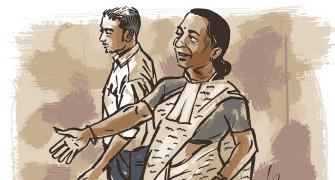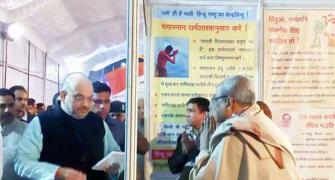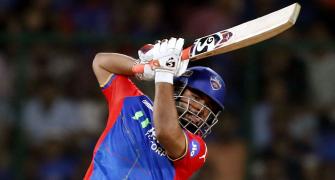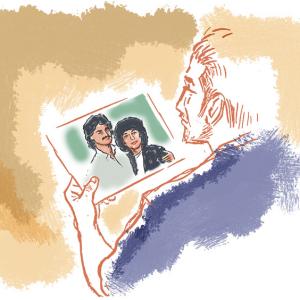After the wedding, Sheena and Mekhail did not meet again.
Four or five months later she met her death.
Mekhail referred to their last meeting without overt emotion, clear-eyed.
Vaihayasi Pande Daniel reports from the Sheena Bora trial.
Illustration: Uttam Ghosh/Rediff.com
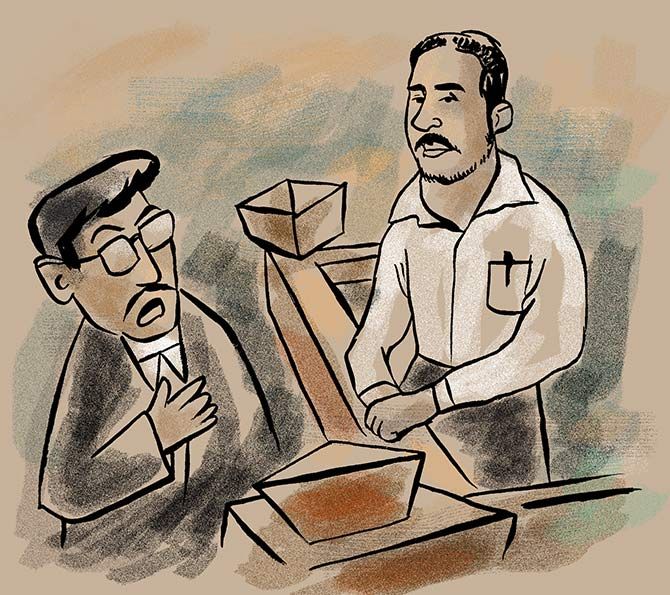
It was not an unequal battle in court on Friday, August 10.
Not at all.
On the first day of Mekhail Upendra Kumar Bora's cross examination of his testimony against his mother by defence lawyer Sudeep Ratnamberdutt Pasbola, the young man performed quite well.
Indrani Mukerjea's son took the stand, to face her lawyer, wearing formal attire -- white shirt, dark trousers, polished black pointed shoes, snazzy belt -- and a black pen in his left pocket, neatly groomed.
He remained calm, collected and sharp-witted under the onslaught of exhaustive questions from the feisty lawyer in the hearing of the Sheena Bora murder trial at CBI Special Courtroom 51, at the Mumbai city civil and sessions court, Kala Ghoda, batting off most of Pasbola's sharp queries efficiently and capably, sometimes hitting a four, if not any flashy sixes.
From time to time Mikhail, 28, even left his crease, where he was batting defensively, to do a spot of bowling, tossing out a curved ball or two at the unsuspecting advocate.
But the hearing progressed almost too peacefully. There was nothing stormy or choppy about it.
The session began 45 minutes late, after a nine-day adjournment because Mekhail had been unable to appear, for lack of means in getting to Mumbai, even though CBI Special Judge Jayendra Chandrasen Jagdale had gently suggested he take a train.
On Friday the court patiently waited for Pasbola to arrive from Bhiwandi, 57 km north, where he was defending Congress President Rahul Gandhi in a defamation suit.
The accused were already in the rickety, dusty, aaropee box behind.
Indrani, her dark hair tumbling over her shoulder, a bright yellow bandhini dupatta swathed around the neck of her white kurta made a striking picture sitting between husband Peter Mukerjea and former husband businessman Sanjeev Khanna.
It is very easy to see why this case fetches so much attention.
How many courtrooms, that you might peep into, in the country features such a tableaux?
An attractive woman, still on the right side of 50, flanked by both an ex and soon-to-be ex-husband, all of them belonging to India's privileged top five per cent and all of them accused of the murder of her daughter in a trial where she is challenged by her son too.
Pasbola strolled in, not a hair out of place, at 3.30 pm and after he had got his bearings, was in conference with Indrani's lawyer Gunjan Mangla and Sanjeev's lawyer Niranjan Mundargi.
He then began to examine his notes, as Mekhail surreptitiously sized him up. You have to admire the agility with which the lawyer moves from one case to the next, changing gears smoothly, as he accelerates up.
He began by addressing Indrani's second born in English, "Mr Mekhail..." when Mekhail immediately and abruptly interrupted him and asked him to speak in Hindi.
The lawyer looked puzzled: "But didn't you study in an English-medium school?"
Mekhail: "English mein fluency nahin hai (I am not fluent in English)."
Pasbola: "Hindi mujhe nahin aayega (I won't know Hindi)," indicating he would find it easier to work in English, even if he was a Hindi speaker.
"Puree padhai English-medium mein hua? (Didn't all your education happen in English?)"
Judge Jagdale intervened smiling: "Let's not land up in a language dispute. It's a volatile issue in this country."
Pasbola then explained that he had reason to quibble with Mekhail about his proficiency in English.
Pasbola to Mekhail: "Arnab Goswami ko jaante ho? (Do you know Arnab Goswami?)"
Mekhail: "Nahin. Naam suna hai (No. I have heard his name)"
Pasbola tried again saying the anchor's name in a proper Assamese tone to Mekhail, "Aarnobe?"
Judge Jagdale, unsure: "That TV anchor?"
Pasbola with a twinkle in his eye: "Ha, actor hai (Yes, the actor)."
Pasbola to Mekhail: "Unhone aap ka interview kiya hai. Puch-taach, sawal-jawab (He interviewed you. Questions. Q and A)"
Mekhail: "Sawaal-jawab kiya. Mulakat nahin hua (He did a Q and A. Never met)."
Pasbola: "Puch-tach ek ghanta ke upar? (Questioning that went over an hour?)"
Mekhail agreed.
Pasbola: "Baat-chit hua English mein (The back and forth happened in English)."
Mekhail: "English mein hua (Happened in English)."
Pasbola: "Is ke alava aur bhi interview diya TV par? (Apart from this you gave other interviews on television?)"
Mekhail: "Ha (Yes)."
Pasbola: "Bahut saara English mein diya (Many of them and in English)."
Mekhail: "Ha, English mein diya (Yes, given in English)."
Pasbola: "Toh jawab diya soch samajh kar diya? (Did you give answers in those television interviews with some thought?)"
Mekhail: "The news of the murder had just broken. Hum kafi disturbed the. Jawaab idhar udhar ho sakta hai (I was very disturbed. The answers could have gone awry)."
Pasbola, instantly alert to what he was suggesting, asked if he was saying that his answers in those interviews were false.
Mekhail quickly: "Sach hai. Yeh nahin ki sach nahin hai. English mein pucha speed mein toh thoda confusion hua (They are true. It is not that they are not true. Asked in English quickly so some amount of confusion happened)."
Pasbola spent the next 15 minutes trying to ascertain Mekhail's educational qualifications and how and when they were achieved.
Pasbola: "Yeh jo aap Open University kiya 12th pass kaun sa saal mein kiya? (This Open University you did, in which year did you pass the 12th?)"
Mekhail smoothly: "Jhoota certificate tha. Indrani ne banaya (It was a false certificate. Indrani had it made)."
Judge Jagdale meanwhile had lost track of the Q and A and asked: "First standard??!" wondering why anyone would forge a certificate for passing the first standard.
A bit of laughter.
Pasbola to the judge: "12th standard!"
Indrani, at the back, looking like this was the first time she was hearing about having organised such a forgery, her face confused, raised both hands in puzzlement, distancing herself from Mekhail's accusation.
Pasbola: "Yeh jo jhoota certificate tha is ke basis mein aap management kiya? (On the basis of this false certificate you did your management?)"
Mekhail: "Ha, Sir."
Pasbola: "Management woh bhi forged hai? (The management degree, is that also forged?)"
Mekhail laconically: "Woh padha tha (That I studied)."
The lawyer asked that if his 12th certificate was forged why had he told the Khar police, north west Mumbai, who were initially handling the murder investigation, that he completed his 12th from the National Institute of Open Schooling.
Pasbola: "CBI ko bataya National Open University kiya (You told the CBI that you did the National Open University)."
Mekhail with pat, infallible logic: "Certificate mila. Toh complete hua (I got a certificate. So I have completed it)."
Pasbola looked at him for a moment startled, and then laughed heartily. He wondered why Mekhail had not mentioned the forgery before.
He also mused aloud why it did not come out in the testimony CBI Special Public Prosecutor Kavita Patil guided Mekhail through in late July.
Pasbola seemed like he was itching for a fight.
Before the tension could begin to rack up and time was wasted, the judge hastily interceded, raising a hand: "The examination is based on the questions put by the prosecution. Now I have not taken down how she took the questions!"
Pasbola rummaged into what else Mekhail had done in Delhi. It emerged he had worked at the Lufthansa airlines's call centre there.
Pasbola smiling broadly: "Wahan Hindi mein baat karte the? (And you spoke in Hindi there?)"
Mekhail unperturbed: "English phrase dete the bolne ke liye (They gave you a bunch of English phrases to answer the client with)."
Something about Mekhail's unwillingness to speak English had Pasbola's antennae up. It was a matter he would return to later for sure because it was not sitting right.
Pasbola: "Wahan kitna pagar milta tha? (What salary were you getting there?)"
Mekhail: "6,000-7,000."
Judge Jagdale dictated for the court record: "60,000-70,000."
Pasbola, mildly astonished, swiftly corrected him.
The lawyer then cut to Mekhail's return to Guwahati, his maternal grandmother's illness and Indrani's financial support of them.
Even if Mekhail never seemed to look at his mother, she often looked at him broodingly, moodily Friday, closely examining his face and listening carefully to what he said.
You could imagine that she was brimming with unspoken thoughts and emotions, that one would not get to hear. She wasn't really taking notes today and occasionally voiced a perhaps frustrated view to Peter.
Mekhail finished his course in hotel management in 2010. Mekhail said Indrani began supporting him and providing for all his and the family's expenses from 2005 through 2014, but Pasbola insisted it was from 2004 when he was in Class 9.
Mekhail stoutly declared Pasbola was wrong.
In 2014 his grandmother had a fall and Indrani instructed they admit her to the Guwahati Medical College Hospital and then later to the Guwahati International Hospital and that she would take care of the expenses.
Pasbola and Mekhail wrangled over the exact details of this and how expenses were paid for.
Mekhail disputed that Indrani had spoken to him directly about any of this and that she instead coordinated both the money and the decisions with his mama (uncle), Amitabh Hazarika.
The lawyer asked Mekhail why in his statement to the Khar police he said it differently -- that he had taken his grandmother to the Guwahati Medical College Hospital on Indrani's instructions.
Mekhail shrugged and added smartly: "Police ko puchiye (Ask the police that)."
Pasbola checked about his passport and the trip he took abroad.
In 2005 he said, he was not exactly sure of the year, he applied for a passport. He still had the passport, but it has expired. Pasbola asked if he could produce it in court. He said he could.
Pasbola: "Passport videsh jaane ke liye nikala. Gaye the? (The passport was made to go abroad. Did you go?)"
Mekhail: "Ek baar (Once)."
Pasbola: "Kitna din ka yatra kiya? (For how many days?)"
Mekhail: "15 din (15 days)."
Pasbola: "Akele gaye? (You went alone?)"
Mekhail: "Nani nana ke saath (With my maternal grandmother and grandfather)."
Pasbola: "Sheena bhi? (Sheena came too?)"
Mekhail: "Ha."
Pasbola: "Kaunsa saal? (What year?)"
Mekhail: "2006."
Pasbola: "Kahan-kahan gaye? (Where did you go?)"
Mekhail: "London aur (and) Europe tour."
Pasbola: "Yeh saare kharch Indrani ne kiya? (Indrani paid for the trip?)"
Mekhail: "Ha."
It was not clear why Pasbola was enquiring about the details of this trip. Perhaps it was an attempt to show that Indrani had been willing to spend money for her parents and her children from her first relationship with Siddhantha Das.
The Q and A turned to Mekhail's stint at the Bangalore International School after Class 10, where Indrani had admitted him after she regained contact with her children.
Pasbola asked if Mekhail knew what fees Indrani was paying and if most of the students were foreigners. And if the students dabbled with "ganja aur charas (marijuana and hashish)."
Pasbola: "Unka rahan-sahan ka standard ucha tha? (Their standard of living was higher?)"
Mekhail: "Ha sir."
Pasbola, purposefully, it seemed, choosing stinging words: "Aap ko inferiority complex feel hota tha?(You had an inferiority complex?)"
Mekhail, unperturbed, didn't dispute that. He did dispute that he had left the school or had been expelled or was stubbornly insistent about wanting to leave Bangalore International. "Request kiya (I requested)."
Pasbola refuted: "Jidh kiya (Stubbornly insisted)."
Mekhail, his manner always mildly brash: "Galat hai (That's wrong)."
Then began a lengthy, mildly bizarre, discussion about Mekhail's drinking habits. What he smoked. What he chewed.
A sharp distinction was made between alcohol and beer. Also between being offered alcohol and actually purchasing it.
Such a discussion rendered in Hindi became more colourful and fascinating.
Interesting too was Mekhail's exact memory for when he drank what, with whom.
Mekhail swore many times that he neither touched marijuana or cigarettes or even chewing tobacco.
Pasbola: "Yeh jo ladke the Bangalore International wahan bahut ganja charas peete the? (Those boys at Bangalore International smoked a lot of marijuana and hashish?)"
Mekhail: "Nahin maloom (I don't know)."
Pasbola: "Aap dusvee standard mein cigarette aur gutka lene laga. Aap ka aadat par gaya (In the 10th standard you started smoking and chewing tobacco. It became a habit)."
Mekhail in a level, steadfast voice: "Galat (Incorrect)."
Pasbola: "Aap gutka nahin khaate the? Cigarette nahin peete the? (You didn't chew tobacco? You didn't smoke cigarettes?)"
Mekhail: "Nahin. When I was studying never."
Pasbola laughed: "Daat, muh se dikhai de raha hai! (Can tell from your face and teeth!)"
Pasbola: "Charas aur ganja ka sutta nahin lagata the? (No puffs of marijuana or hashish?)"
Mekhail denied it, choosing that moment to fiddle with the pen in his shirt pocket, dust imaginary specks off his shirt and adjust the roll of one of his shirt sleeve.
Judge Jagdale looked baffled with the word sutta and looked at Pasbola: "Whether he has experienced it?"
Pasbola, his face mischievous: "Not me sir. Puffs. Puffs!"
Pabola wanted to know why he told the Khar police he had a tobacco habit.
Mekhail: "Paan khate the. Unse puchiya (I ate paan. Ask them)."
The lawyer attempted to confirm why he told the Khar police that the students dabbled in marijuana and hashish.
Pasbola: "Aise kyo likha? (Why is it written there?)"
Mekhail cockily: "Mere ko kya patta? (How would I know?)."
Pasbola: "Drinks kab se peete the? (When did you start drinking?)"
Mekhail: "Sochta hoon (Let me think)."
Pasbola: "Socho! (Think!)"
There was a moment of silence.
The judge looked up from his papers wondering what was going on.
Pasbola: "He is thinking."
Mekhail, after a lot of thought, offered: "First time Indrani ke saath beer piya 2006 mein (I first drank beer with Indrani in 2006)."
The statement had all the portent Mekhail perhaps intended, offering the image of a young boy having beer in India with his mother, who eventually killed his sister.
Judge Jagdale: "Alcohol?"
CBI Special Public Prosecutor Bharat Badami firmly: "Beer."
A discussion ensued between the difference between alcohol and beer.
Pasbola: "Alcohol ka matlab vodka, whiskey (Alcohol means vodka, whiskey)..."
Judge Jagdale weighed in: "More amount of alcohol."
Mekhail said he started having liquor on his own in 2011, although there was some confusion between when he started buying it himself and if that was more voluntary than having it at a social gathering or a pub, when it was offered to him.
Mekhail confessed to having exactly two pegs, once in a way. Daily? Never. Only "kabhi kabhi (sometimes)."
Judge Jagdale asked bewildered what the point of this discussion was and where it was headed. "It is permissible by the law."
Pasbola: "I am not saying he is doing something bad." Although the undertone of the entire discussion hinted that way exactly.
Pasbila indicated he had a purpose to this line of questioning.
Badami cheerily: "We are also not objecting!"
Judge Jagdale, beaming: "You are enjoying it."
Badami laughed hugely.
Pasbola, delving further, with zeal: "Drinks dost ke saath peete the? Akela? (You drank with friends? Alone?)"
Mekhail, matter-of-factly, carelessly, as if it did not mean much, with the insouciance of the younger generation teaching something to the more conservative older generation: "Dost ke saath. Kabhi akela (With friends. Alone sometimes)."
Pasbola asked how many times he had drank with Indrani after the beer episode and, apart from that, if he had ever drunk anything before 2011.
Mekhail remembered very precisely his "drinks" outings with Indrani -- beer in 2006, vodka in Mumbai in April 2012, the day Sheena was murdered and vodka with her in Guwahati in 2014.
Other than that he had not drunk before 2011.
He quickly revised his answer, reminding the court of the tequilas he had with Sanjeev Khanna at a Mumbai club. Pasbola and Mundargi snickered.
The rest of Friday's cross examination was about the several phone numbers Mekhail used and his last meeting with Sheena.
Pasbola kept reading out phone numbers to Mekhail and asked him to identify them. He identified all five or six of them.
Some were his Guwahati numbers, other were Delhi numbers.
Two belonged to his girlfriend Supriya Pathak, whose phone he would borrow.
One of the numbers was discontinued because he could not pay the bill.
His last meeting with Sheena occurred at the wedding they both attended of Sheena's buddy Sanjana Phukan in Guwahati in 2011.
Pasbola and Mekhail started to argue about the dates of the wedding.
Pasbola said it was November. Mekhail said it was December.
Pasbola wanted to know why he gave the Khar police the wrong information.
Mekhail getting worked up: "Woh photo abhi bhi Facebook par hai. Aap dekh sakte hai (That photograph is still up on Facebook. You can take a look )."
Judge Jagdale irritated: "We have a lot of cases. We don't have time to look at Facebook!'
Mekhail backtracked a bit and said the wedding was between November and December and he was not sure of the exact dates.
After the wedding, Sheena and Mekhail did not meet again.
It was his last meeting with his sister. Four or five months later she met her death.
Mekhail referred to it without overt emotion, clear-eyed.
They kept in touch on the telephone, he admitted, infrequently and on text and Facebook chat.
Pasbola: "Last Facebook chat kab hua tha Sheena ke saath? (When was your last chat with Sheena on Facebook?)"
Mekhail strangely did not have an answer: "Yaad nahin (Don't remember)."
Pasbola considered this, slightly mystified, and then asked if he had shown his Facebook chats with Sheena to the police and if they had asked about them.
Mekhail said he had not.
The next hearing was scheduled for August 13. Pasbola was hoping to have it set for August 14.
Judge Jagdale refused inflexibly. "You should stick to your promise."
The next 20 minutes were hectic. The accused held various rounds of consultations with their lawyers.
Sanjeev received a fresh stack of clothes from his Bengaluru cousin.
Peter ate his lunch with his sister Shangon Das Gupta, starting off with a salad this time, before diving into his favourite burger.
Indrani's family lawyer Edith Dey, who is following up on her divorce filings, circled the room waiting for Indrani to finish first with Pasbola, Mangla and then the CBI officer from Delhi who is working on the Karti Chidambaram case.
Earlier this week, Indrani filed a request for bail saying her life was in danger whilst she was in jail.
Dey needed Indrani's passport photograph for the divorce filing. Indrani didn't have any more pictures of herself.
Dey turned to Peter asking if he happened to have a picture of Indrani, the wife who was divorcing him.
Peter, taken aback, shrugged. He didn't have any. It was a strange request.
It was nearly 5.30 and the clerks were ready to close up Courtroom 51. They ordered everyone to finish up.
The police bustled everyone out and back to jail.
Mekhail had departed long before that.
- MUST READ: The Sheena Bora Murder Trial

